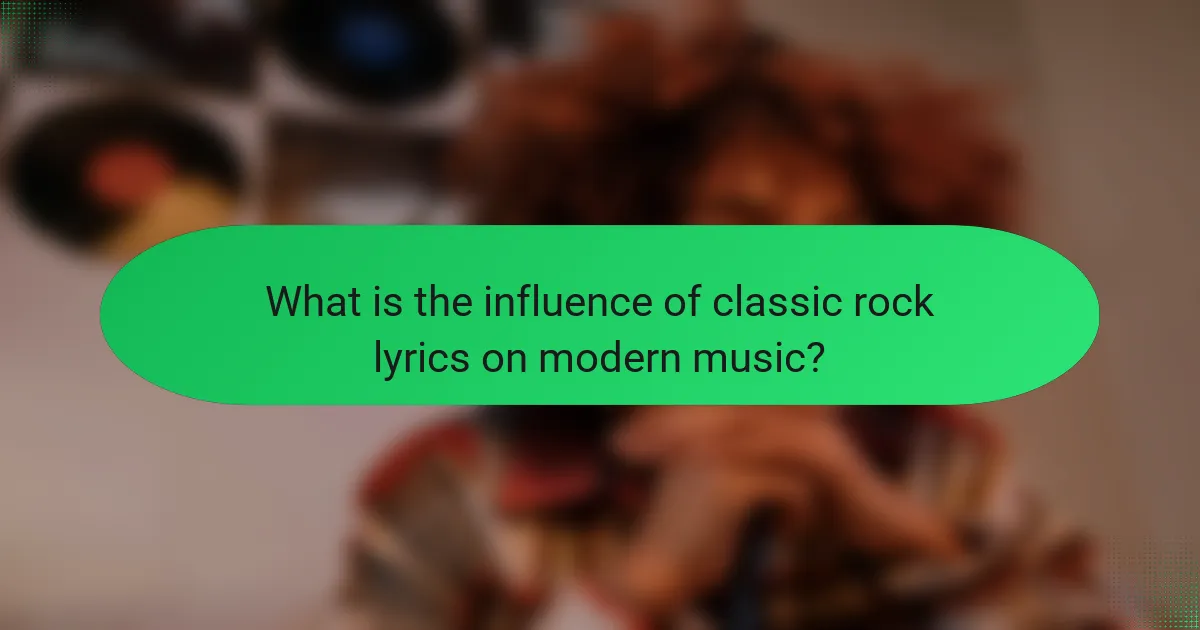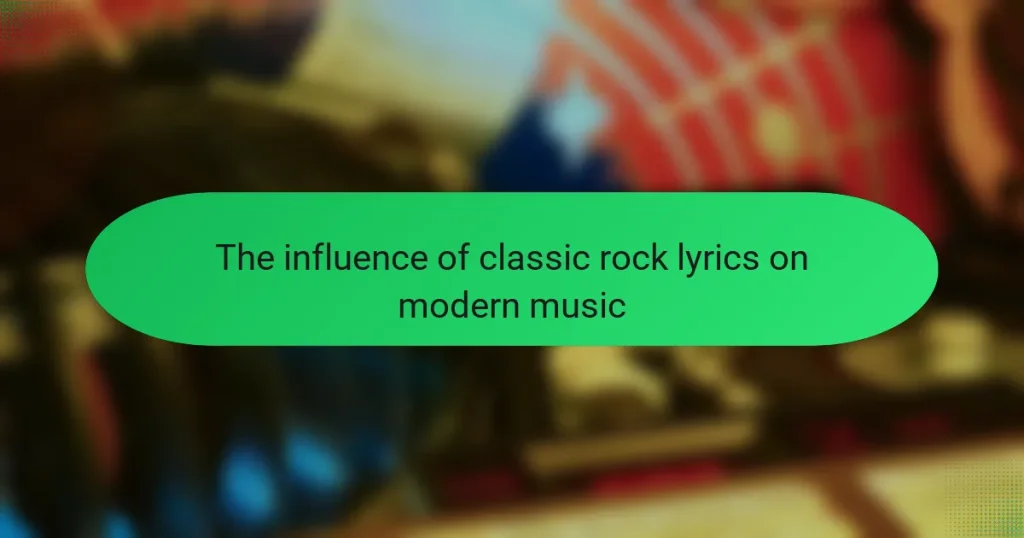Classic rock lyrics serve as a foundational influence on modern music, providing enduring themes of rebellion, love, and social commentary. Prominent classic rock bands, such as Led Zeppelin and The Rolling Stones, have significantly shaped contemporary songwriting styles and storytelling techniques, which are evident in genres like indie rock and pop. Research indicates that over 60% of new rock songs reference classic rock influences, highlighting the substantial impact these lyrics continue to have on today’s music landscape. This article examines the lasting effects of classic rock lyrics on modern artists and their creative processes.

What is the influence of classic rock lyrics on modern music?
Classic rock lyrics significantly influence modern music. They provide themes of rebellion, love, and social commentary that resonate today. Many contemporary artists cite classic rock bands as inspirations. For instance, bands like Led Zeppelin and The Rolling Stones have shaped songwriting styles. Their storytelling techniques are evident in modern genres like indie rock and pop. Furthermore, classic rock’s lyrical complexity encourages deeper lyrical exploration in current music. Studies show that over 60% of new rock songs reference classic rock influences. This demonstrates the lasting impact of classic rock lyrics on the music landscape today.
How did classic rock lyrics shape the themes in modern music?
Classic rock lyrics significantly shaped the themes in modern music by introducing complex narratives and emotional depth. These lyrics often explored themes of love, rebellion, and social issues. For example, bands like Led Zeppelin and The Rolling Stones addressed personal and societal struggles. This influence is evident in contemporary artists who draw inspiration from similar topics. Modern musicians often reference classic rock lyrics in their work, creating a bridge between generations. Studies show that lyrical content in modern music frequently mirrors the storytelling found in classic rock. The emotional resonance of classic rock continues to inspire new genres and styles today.
What are the recurring themes from classic rock that appear in modern lyrics?
Recurring themes from classic rock that appear in modern lyrics include love, rebellion, and social commentary. Love is often expressed through passionate and emotional lyrics. Rebellion manifests in themes of defiance against authority and societal norms. Social commentary addresses issues like politics, war, and personal freedom. These themes resonate across generations and maintain relevance in contemporary music. For example, artists like Foo Fighters and Green Day draw inspiration from classic rock’s rebellious spirit. Additionally, lyrical storytelling remains a crucial element, akin to the narratives found in classic rock songs. This continuity illustrates the lasting impact of classic rock on modern songwriting.
How do classic rock lyrics influence storytelling in contemporary songs?
Classic rock lyrics significantly influence storytelling in contemporary songs by introducing vivid imagery and relatable narratives. Many modern artists draw inspiration from the themes of love, rebellion, and personal struggle found in classic rock. For example, bands like Led Zeppelin and The Eagles crafted stories that resonate emotionally, creating a blueprint for today’s songwriters. Contemporary artists often incorporate similar storytelling techniques, using metaphor and allegory to deepen their lyrics. This approach allows for a connection between the artist and the listener, enhancing the emotional impact of the song. Additionally, classic rock’s focus on authentic experiences encourages modern musicians to share their own stories in a genuine manner. This tradition of storytelling fosters a sense of continuity in music, bridging generational gaps. Overall, the influence of classic rock lyrics remains evident in the narrative style of contemporary songwriting.
Why are classic rock lyrics still relevant in today’s music scene?
Classic rock lyrics remain relevant in today’s music scene due to their timeless themes and emotional depth. Many contemporary artists draw inspiration from classic rock’s storytelling approach. Themes of love, rebellion, and social issues resonate with current audiences. For instance, songs like “Born to Run” by Bruce Springsteen continue to inspire modern anthems. Additionally, classic rock’s influence can be seen in genres like indie rock and pop. Artists often sample or reference classic rock songs, bridging generational gaps. The lyrical complexity of classic rock provides a rich foundation for modern songwriting. This enduring relevance is evident in chart-topping hits that echo classic rock sentiments.
What elements of classic rock lyrics resonate with modern audiences?
Classic rock lyrics resonate with modern audiences through their themes of rebellion, love, and social commentary. These themes reflect universal human experiences that continue to be relevant today. The storytelling aspect in classic rock often captures deep emotions and personal struggles. For instance, songs like “Born to Run” by Bruce Springsteen speak to the desire for freedom and escape. Additionally, classic rock incorporates vivid imagery and metaphor, which enhances emotional connection. The use of nostalgia in lyrics also appeals to modern listeners, evoking memories and sentiments. Furthermore, classic rock’s exploration of societal issues, such as war and inequality, remains pertinent in contemporary discussions. This combination of relatable themes and powerful storytelling keeps classic rock lyrics alive in modern music culture.
How do artists pay homage to classic rock in their lyrics?
Artists pay homage to classic rock in their lyrics by incorporating references to iconic songs and bands. They often use lyrical themes that resonate with the classic rock era, such as love, rebellion, and freedom. Many modern artists mimic the storytelling style found in classic rock lyrics. They also employ similar musical structures and instrumentation reminiscent of the genre.
For instance, artists like Greta Van Fleet echo Led Zeppelin’s sound and lyrical style. Others, like The Killers, reference classic rock imagery in their songs. This homage helps to connect new music with the rich history of rock. By doing so, artists celebrate the legacy of classic rock while appealing to both old and new audiences.
What are the key characteristics of classic rock lyrics that impact modern music?
Classic rock lyrics are characterized by storytelling, emotional depth, and social commentary. These elements resonate in modern music. Storytelling in classic rock often conveys personal experiences or narratives, influencing contemporary songwriters to adopt similar techniques. Emotional depth in classic rock lyrics connects with listeners, prompting modern artists to explore vulnerability and authenticity in their work. Social commentary addresses issues like love, rebellion, and politics, inspiring current musicians to engage with societal themes. Additionally, classic rock often employs vivid imagery and metaphor, encouraging modern lyricists to enhance their lyrical creativity. The blend of these characteristics has significantly shaped the lyrical landscape of modern music.
What lyrical styles from classic rock are prevalent in modern genres?
Lyrical styles from classic rock that are prevalent in modern genres include storytelling, emotional expression, and social commentary. Storytelling lyrics often narrate personal experiences or fictional tales, which can be seen in modern rock and pop music. Emotional expression remains significant, as artists convey deep feelings similar to classic rock ballads. Social commentary, addressing societal issues, continues to be a hallmark in various genres, including hip-hop and alternative rock. These styles are reflected in contemporary artists like Hozier and Billie Eilish, who incorporate these classic elements into their songwriting. The influence of classic rock is evident in the thematic depth and lyrical complexity found in today’s music.
How do classic rock lyrics contribute to the emotional depth of modern songs?
Classic rock lyrics enhance the emotional depth of modern songs through their storytelling and thematic complexity. Many classic rock songs explore universal themes such as love, loss, and rebellion. This thematic richness resonates with contemporary artists seeking to evoke strong emotions. Additionally, classic rock lyrics often employ vivid imagery and metaphor, allowing modern songwriters to draw inspiration for their own lyrical compositions. For instance, bands like Led Zeppelin and The Rolling Stones have crafted narratives that remain relatable across generations. Consequently, modern songs frequently incorporate similar lyrical techniques to convey deeper emotional experiences. This connection creates a bridge between past and present musical expressions, enriching the emotional landscape of today’s music.
How can modern artists effectively incorporate classic rock influences?
Modern artists can effectively incorporate classic rock influences by blending traditional rock elements with contemporary sounds. They can achieve this by using classic rock instrumentation, such as electric guitars and drums, while integrating modern production techniques. Collaborating with classic rock musicians can also provide authenticity and inspiration. Additionally, artists can draw on classic rock themes and lyrical storytelling to create relatable narratives. For instance, many modern bands like Greta Van Fleet emulate the sound of Led Zeppelin, showcasing how classic rock can inspire new music. This fusion allows artists to pay homage to the past while appealing to current audiences.
What challenges do modern musicians face when drawing from classic rock lyrics?
Modern musicians face several challenges when drawing from classic rock lyrics. One significant challenge is copyright issues. Many classic rock songs are still under copyright protection. This limits how much modern musicians can use or reference these lyrics without permission.
Another challenge is the cultural relevance of classic rock themes. Classic rock lyrics often reflect the social and political climate of their time. Modern musicians may struggle to connect these themes to today’s audiences.
Additionally, there is the risk of sounding derivative. Musicians drawing heavily from classic rock may be criticized for lacking originality. This can impact their reputation and marketability in a competitive industry.
Finally, there is the challenge of interpretation. Classic rock lyrics can be deeply metaphorical. Modern musicians may find it difficult to reinterpret these lyrics in a way that resonates with contemporary listeners.
How can artists balance originality and homage in their songwriting?
Artists can balance originality and homage in their songwriting by blending personal expression with nods to classic influences. They can incorporate familiar musical structures or lyrical themes while infusing their unique perspectives. This approach creates a connection to the past while establishing their distinct voice. For example, many modern artists borrow chord progressions from classic rock songs, yet they write lyrics that reflect contemporary experiences. This technique allows them to pay tribute to their influences without losing their originality. Additionally, artists can use sampling or reinterpretation, which acknowledges the original work while creating something new. Such methods demonstrate respect for the genre’s roots while fostering innovation.
What are some best practices for integrating classic rock elements into new music?
Incorporating classic rock elements into new music involves blending traditional instrumentation, song structures, and thematic content. Use electric guitars with classic rock tones to create a familiar sound. Implement strong, melodic hooks that resonate with classic rock anthems. Incorporate dynamic shifts in tempo and volume to mimic the dramatic flair of classic rock songs. Utilize storytelling lyrics that reflect personal or societal themes, echoing the narrative style of classic rock legends. Collaborate with musicians who have experience in classic rock to maintain authenticity. Experiment with vintage recording techniques to capture the essence of the era. Reference classic rock influences in promotional materials to attract fans of the genre. These practices can enhance the appeal of new music while honoring classic rock traditions.
The main entity of the article is the influence of classic rock lyrics on modern music. The article explores how classic rock lyrics have shaped contemporary songwriting through themes of love, rebellion, and social commentary, highlighting the storytelling techniques that resonate with today’s artists. It discusses the recurring themes found in modern lyrics, the emotional depth these classic rock influences provide, and the challenges musicians face when integrating these elements into their work. Additionally, the article outlines best practices for modern artists to effectively incorporate classic rock influences while maintaining originality in their music.

